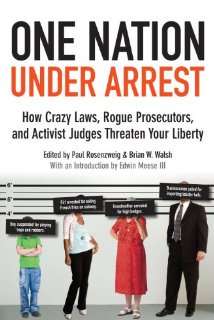Congress Is Creating an Over-Criminalization Task Force. Will it Tackle the Drug War?
Don't hold your breath.

Earlier this week the House of Representatives announced the creation of the Over-Criminalization Task Force of 2013. Between now and Nov. 30, 2013, five Democrats and five Republicans will "conduct hearings and investigations relating to over-criminalization issues" and release reports.
With over 4,500 federal crimes in the U.S. code, which ones can we expect the task force to tackle?
Matt Sledge of the Huffington Post reports that task force member Rep. Hakeem Jeffries (D-N.Y.) hopes to "examine the drug laws in this country." Fellow task force members Steve Cohen (D-Tenn.) and Jerry Nadler (D-NY.), both co-sponsors of marijuana reform bills, will likely want to do the same. Rep. Bobby Scott (D-Va.) will definitely have something to say about mandatory minimums, seeing as he and Rep. Thomas Massie (R-Ky.) co-sponsored the Justice Safety Valve Act of 2013 (a version of which Sen. Rand Paul introduced in the Senate). Rep. Karen Bass (D-Calif.), meanwhile, supports the Ending Federal Prohibition of Marijuana Act and the Federal Prison Bureau Nonviolent Offender Relief Act.
In other words, the task force Democrats are united in wanting federal drug law reform.
But what about the Republican members? In the late 90s, task force chair Rep. James Sensenbrenner (R-Wisc.) opposed federal funding of clean needle exchanges and allowing D.C. to implement a medical marijuana program. In 2005, he introduced the borderline-insane Safe Access to Drug Treatment and Child Protection Act:
The bill creates harsh new penalties for a variety of nonviolent drug offenses, including a mandatory minimum five years for anyone who passes a joint to someone who has ever been in drug treatment, five years for someone who has been in treatment who asks a friend to find them drugs, and ten years for mothers who have been in treatment who commit certain drug offenses at home -- even if their kids aren't there.
Another task force member, Rep. Spencer Bachus (R-Ala.), supports the ONDCP's (ineffective) anti-marijuana advertising campaign and is a staunch opponent of online gambling. (Fun fact: In 2010, he accused Bill Maher of treason.) Neither Rep. Louie Gohmert (R-Texas) nor Rep. Raul Labrador (R-Idaho) is on the record supporting or opposing any drug-related bills. While that's also true for Rep. George Holding (R-N.C.), the former prosecutor's campaign website features a revealing boast: "When he left office the average sentence in drug trafficking cases in eastern North Carolina was almost twice the national average." Seeing as the bulk of federal drug offenders are doing time for trafficking, I don't imagine Holding will be all that interested in reducing penalties for them.
And let's not forget that Judiciary Committee Chairman Rep. Bob Goodlatte (R-Va.) will be an ex officio member of the task force and a gatekeeper of sorts for the task force's recommendations. He's on record as "oppos[ing] any effort to legalize marijuana." Goodlatte's big concern, which he shares with the other Republican members of the task force, is the increasing number of Americans "who have found themselves breaking the law with no intent of doing so."
Rep. John Conyers, who, as ranking member of the Judiciary Committee, is also an ex officio member of the task force, wants the group to address the fact that "the incarceration rate for African Americans is six times that of the national incarceration average."
Hopefully, the task force will find a way to address cases like this one and cases like this one.
Consolation prize: None of these people are on the task force.


Show Comments (46)